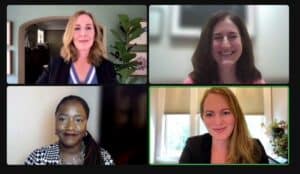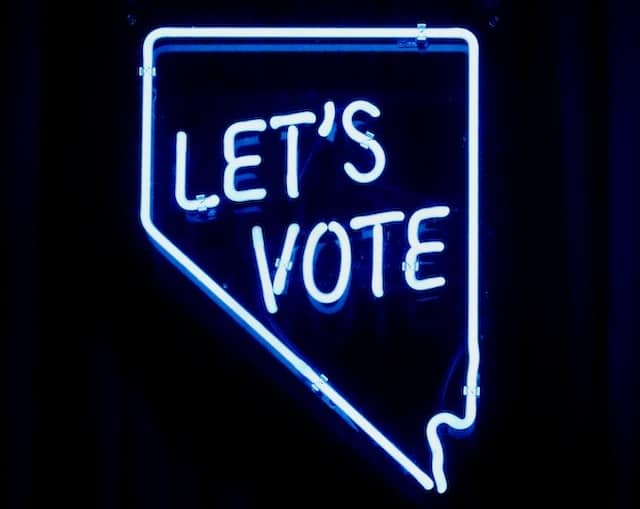As the January 6 Committee to investigate the plot to overthrow the 2020 Presidential election gets set to hold its ninth and possibly final televised hearing next week, elections experts are sounding the alarm on clear and present threats to our nation’s ability to undertake a free and fair midterm election this November 8th.
The non-partisan, non-profit organization Protect Democracy hosted a webinar this week featuring members of the National Task Force on Election Crises, in which Political IQ took part.

Spike in Laws Restricting Voting
Since the 2020 election, Wendy Weiser, Vice President and Director of the Democracy Program at the Brennan Center for Justice at NYU School of Law, says her organization has been tracking and documenting a “spike in laws restricting access to voting” along with a “novel trend of laws that enable partisans to interfere in election administration.”
She adds that even though more than half of these new restrictions have been challenged in courts, virtually all have been allowed to stay on the books “because of what the Supreme Court has done in its shadow docket.”
The Court, she explains, has expanded a “judge-made doctrine that says that courts should not change election rules before an election. This has been interpreted in a way that gives states legislatures at least one free pass of having voting restrictions or subversion measures in place.”
This is troubling to Janai Nelson, President and Director-Counsel of the NAACP Legal Defense Fund, who says, “Voter suppression is in many ways its own form of election sabotage, ensuring that the will of the majority, that the increasingly diverse electorate that we have in the country, cannot register its voice through the ballot.”
Election Deniers Proliferate
Both on the ballot and off, the experts say there is a deluge of individuals bulldozing The Big Lie—that Trump won the 2020 election, and Biden is an “illegitimate” President.
One of the “multiple ways in which the election denialism movement is creating risk for the election,” says Weiser, is “insider threats—efforts to infiltrate election administrative functions, which has created risks for the security of election equipment and infrastructure. It has also created risks for trust in the election infrastructure.”
Since the 2020 election, she says there have been at least 17 reported incidents where conspiracy theorists have gained or attempted to gain access to voting equipment that resulted in security breaches. That has led to a number of jurisdictions having to decommission and purchase new machinery.
She adds, “We are watching the potential risk from poll worker recruitment of those who are election deniers.” While stressing the importance of poll workers across the political spectrum, she says individuals “actively promoting falsehoods or [those who] might even seek to undermine or sabotage elections are also being recruited.”
Further, she has reports that those training poll workers have encouraged them to “violate the law, or to engage in misconduct.”
And then there are the candidates, themselves.
“We have election deniers who are actively gaining ground in states across the country as candidates for secretary of state, as candidates for governor,” says Nelson. These are governmental positions that “not only hold power within that state, their election outcomes, but as we know in federal elections and especially in Presidential elections, in delivering the electors and ensuring that we have a peaceful transfer of power.”
She issues a dire warning, “Once they have the power of law behind them, once they have a title and an office and an entire state apparatus to utilize to dismantle our democracy, we will have very little recourse.”
NBC reports that 27 states have election deniers running for Governor, Secretary of State, and/or Attorney General in this year’s midterm.
Further, says Weiser, during the primaries at least a dozen candidates claimed fraud, including some who won their races. “So this is a tactic that we are watching for” in the general election, she says. “We are worried that this could lead to an election crisis.”
The 2020 Election Never Really Ended
“The reality for many election officials today is that there has been no real end to 2020,” according to Jennifer Morrell, Partner with the Elections Group who visits often with local and state election officials. She says they’re “constantly in a defensive posture. Having to continually defend the integrity of the 2020 election and subsequent elections has left little time, if any, for process improvement.”
This has included dealing with a “tsunami of open records requests that has impacted every single state and local election office in the country, and it shows no sign of slowing down.”
Add to this, election workers are dealing with the same supply chain issues as the rest of the country—the paper needed for ballots and other materials and equipment—amid what’s likely to be an especially high-turnout midterm election.
The bottom line, says Morrell, “They’re exhausted. They’re dealing with real symptoms of burnout and post-traumatic stress.”
Her concern is that in our heated political climate, “an innocent mistake, or even something more normal like long lines or the late opening of a polling location or a longer than expected time to report initial results on election night, [could] somehow be used to further undermine the work of these election professionals.”
She points out that it was in a relatively “small, unknown” jurisdiction in Michigan that a “very simple, innocent mistake was made that sort of became the seed for this widespread conspiracy around a voting system,” referring to the Dominion dispute after the 2020 election.
The Good News: Infrastructure, Professionals Are in Place
The panel stresses that it’s not all doom and gloom.
“States actually have rules and infrastructure in place that can be mobilized, that can be used to prevent workers from causing disruptions,” says Weiser. “So while the threats are unprecedented in scope, we need to match that with unprecedented vigilance and focus to activate the guardrails against these threats.”
Morrell touts “the maturity in the level of communication materials and things that have gone out from state and local election offices to try to educate voters, other members of the public, on how the process actually works.”
She says election organizations are dispelling myths and shooting down rumors through both social media and direct engagement with local media. She points to the Bay Area Coalition in California as a success story, where a handful of jurisdictions joined forces with community and advocacy groups to amplify their message through private tours and handouts.
Morell goes on to underscore the professionalism of election officials and their staffs. “Cumulatively [they] have many, many years of experience administering elections,” she says. “They’ve attended professional development conferences, completed state-run certification courses, and reviewed dozens if not hundreds of guidelines and other resource material to help them be successful in administering an election that is fair, secure and transparent.”
Best Defense: An Informed, Involved Citizenry
A critical task between now and the election, says Weiser, will be “pushing back on the misinformation…making sure people know what to expect.”
She adds, “When people who don’t believe in the validity of the 2020 election volunteer to be election workers or poll workers, their trust in elections goes up dramatically, once they are part of the process and they see what happens.”
“It is imperative that everyone who is interested in preserving the integrity of our democracy participate in our elections beyond voting,” says Nelson. “That they participate by sharing reliable information, that they participate by powering the polls and serving as part of our election administrative apparatus.”
If you would like to volunteer to be a poll worker in your area, you can sign up at powerthepolls.org.


